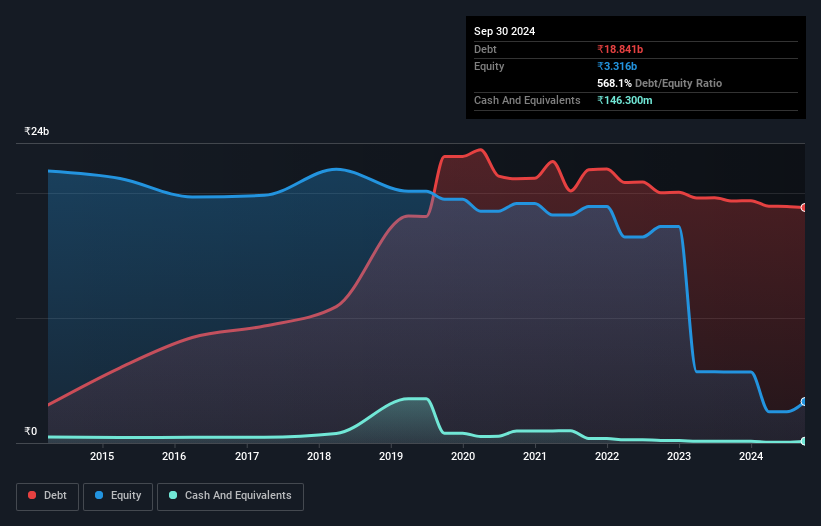McLeod Russel India (NSE:MCLEODRUSS) Has Debt But No Earnings; Should You Worry?
The external fund manager backed by Berkshire Hathaway's Charlie Munger, Li Lu, makes no bones about it when he says 'The biggest investment risk is not the volatility of prices, but whether you will suffer a permanent loss of capital.' When we think about how risky a company is, we always like to look at its use of debt, since debt overload can lead to ruin. We can see that McLeod Russel India Limited (NSE:MCLEODRUSS) does use debt in its business. But is this debt a concern to shareholders?
Why Does Debt Bring Risk?
Debt and other liabilities become risky for a business when it cannot easily fulfill those obligations, either with free cash flow or by raising capital at an attractive price. Part and parcel of capitalism is the process of 'creative destruction' where failed businesses are mercilessly liquidated by their bankers. However, a more usual (but still expensive) situation is where a company must dilute shareholders at a cheap share price simply to get debt under control. Of course, the upside of debt is that it often represents cheap capital, especially when it replaces dilution in a company with the ability to reinvest at high rates of return. When we examine debt levels, we first consider both cash and debt levels, together.
View our latest analysis for McLeod Russel India
What Is McLeod Russel India's Debt?
The chart below, which you can click on for greater detail, shows that McLeod Russel India had ₹18.8b in debt in September 2024; about the same as the year before. And it doesn't have much cash, so its net debt is about the same.

A Look At McLeod Russel India's Liabilities
The latest balance sheet data shows that McLeod Russel India had liabilities of ₹33.1b due within a year, and liabilities of ₹1.41b falling due after that. Offsetting this, it had ₹146.3m in cash and ₹1.16b in receivables that were due within 12 months. So it has liabilities totalling ₹33.2b more than its cash and near-term receivables, combined.
The deficiency here weighs heavily on the ₹3.79b company itself, as if a child were struggling under the weight of an enormous back-pack full of books, his sports gear, and a trumpet. So we definitely think shareholders need to watch this one closely. After all, McLeod Russel India would likely require a major re-capitalisation if it had to pay its creditors today. The balance sheet is clearly the area to focus on when you are analysing debt. But you can't view debt in total isolation; since McLeod Russel India will need earnings to service that debt. So when considering debt, it's definitely worth looking at the earnings trend. Click here for an interactive snapshot.
In the last year McLeod Russel India had a loss before interest and tax, and actually shrunk its revenue by 8.7%, to ₹12b. That's not what we would hope to see.
Caveat Emptor
Importantly, McLeod Russel India had an earnings before interest and tax (EBIT) loss over the last year. Its EBIT loss was a whopping ₹1.2b. Reflecting on this and the significant total liabilities, it's hard to know what to say about the stock because of our intense dis-affinity for it. Sure, the company might have a nice story about how they are going on to a brighter future. But the reality is that it is low on liquid assets relative to liabilities, and it burned through ₹44m in the last year. So we consider this a high risk stock, and we're worried its share price could sink faster than than a dingy with a great white shark attacking it. When analysing debt levels, the balance sheet is the obvious place to start. But ultimately, every company can contain risks that exist outside of the balance sheet. Be aware that McLeod Russel India is showing 4 warning signs in our investment analysis , and 2 of those are potentially serious...
If you're interested in investing in businesses that can grow profits without the burden of debt, then check out this free list of growing businesses that have net cash on the balance sheet.
New: Manage All Your Stock Portfolios in One Place
We've created the ultimate portfolio companion for stock investors, and it's free.
• Connect an unlimited number of Portfolios and see your total in one currency
• Be alerted to new Warning Signs or Risks via email or mobile
• Track the Fair Value of your stocks
Have feedback on this article? Concerned about the content? Get in touch with us directly. Alternatively, email editorial-team (at) simplywallst.com.
This article by Simply Wall St is general in nature. We provide commentary based on historical data and analyst forecasts only using an unbiased methodology and our articles are not intended to be financial advice. It does not constitute a recommendation to buy or sell any stock, and does not take account of your objectives, or your financial situation. We aim to bring you long-term focused analysis driven by fundamental data. Note that our analysis may not factor in the latest price-sensitive company announcements or qualitative material. Simply Wall St has no position in any stocks mentioned.
About NSEI:MCLEODRUSS
McLeod Russel India
Engages in the cultivation, processing, manufacture, and sale of tea in India, Vietnam, Uganda, the United Kingdom, and internationally.
Mediocre balance sheet with low risk.
Market Insights
Community Narratives



